INDIAN ARMED FORCES CHIEFS ON OUR RELENTLESS AND FOCUSED PUBLISHING EFFORTS

The insightful articles, inspiring narrations and analytical perspectives presented by the Editorial Team, establish an alluring connect with the reader. My compliments and best wishes to SP Guide Publications.

"Over the past 60 years, the growth of SP Guide Publications has mirrored the rising stature of Indian Navy. Its well-researched and informative magazines on Defence and Aerospace sector have served to shape an educated opinion of our military personnel, policy makers and the public alike. I wish SP's Publication team continued success, fair winds and following seas in all future endeavour!"

Since, its inception in 1964, SP Guide Publications has consistently demonstrated commitment to high-quality journalism in the aerospace and defence sectors, earning a well-deserved reputation as Asia's largest media house in this domain. I wish SP Guide Publications continued success in its pursuit of excellence.
- Operation Sindoor: Resolute yet Restrained
- India’s Operation Sindoor Sends a Clear Message to Terror and the World – ‘ZERO TOLERANCE’
- Japan and India set forth a defence cooperation consultancy framework, talks on tank and jet engines
- Terrorist Attack in Pahalgam in Kashmir: Unfolding a long surgical war against PAK
- Lt General Pratik Sharma takes over Command of Indian Army's Northern Command
India-Australia 2+2 Ministerial Dialogue
Both India and Australia agreed to work jointly to realise full potential of the bilateral Comprehensive Strategic Partnership (CSP).
 |
The Author is Former Director General of Information Systems and A Special Forces Veteran, Indian Army |
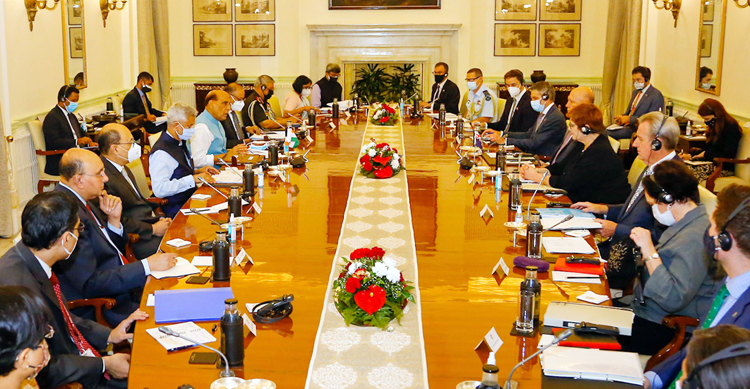
External Affairs Minister S. Jaishankar and Defence Minister Rajnath Singh held the in-person 2+2 ministerial dialogue with their Australian counterparts Marise Payne and Peter Dutton respectively on September 11, 2021. The visiting Australian ministers later also called on Prime Minister Narendra Modi. India already has 2+2 Ministerial Dialogue with the US and Japan and is in the process of institutionalising such a framework with Russia.
During the 2+2 Dialogue, both countries discussed institutional frameworks for wide-ranging collaboration
In June 2020, India and Australia had elevated their ties to a Comprehensive Strategic Partnership (CSP) and signed a landmark deal for reciprocal access to military bases for logistics support during an online summit between Prime Minister Narendra Modi and his Australian counterpart Scott Morrison. The Australian Navy was part of the recent Malabar naval exercise that also featured navies of India, the US and Japan.
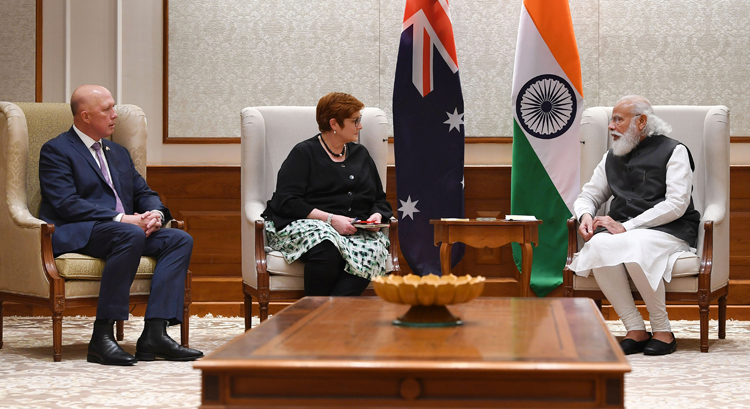
During the 2+2 Dialogue, both countries discussed institutional frameworks for wide-ranging collaboration including expanding military engagements across services and facilitate greater sharing of critical information in line with their resolve to significantly expand strategic ties. Regional and international developments including the situation in Afghanistan and issues pertaining to the Indo-Pacific region were discussed.
After the dialogue, ministers of both counties held a joint press meeting and Defence Minister Rajnath Singh issued a statement, highlights of which are:
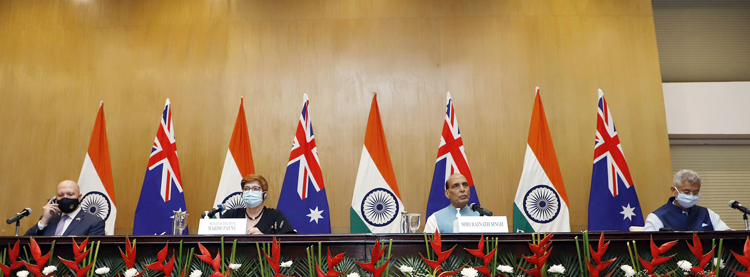
- Defence Minister Rajnath Singh
- The 2+2 dialogue signifies importance of the India-Australia comprehensive strategic partnership. Both countries share the vision of free, open, inclusive and prosperous Indo-Pacific region.
- We discussed various institutional frameworks for wide-ranging collaboration including defence cooperation, fighting pandemic, maritime security, cooperation in multilateral formats, and exchanged views on Afghanistan.
- In terms of defence cooperation, we decided to expand military engagements across services, facilitate greater defence information sharing and to work closely for mutual logistic support.
- We invited Australia to engage India's growing defence industry and to collaborate in co-production and co-development of defence equipment.
- India is committed to building a robust partnership with Australia for security and growth of the entire region.
- Australian Defence Minister Peter Dutton
- Australia and India's defence relationship is at a historic high. India is a rising Indo-Pacific great power and an increasingly significant partner for Australia, particularly in the maritime domain.
- Both nations depend on free and open access to sea lanes in the Indo-Pacific for our trade and economic well-being and we share an unwavering commitment to upholding the rules-based international order and ensuring that Indo-Pacific is open inclusive and prosperous.
- External Affairs Minister S. Jaishankar
- The 20th anniversary of the September 11 terror attacks is a reminder of the importance of containing terrorism without compromise. Close as we are to its epicentre, let us appreciate the value of international cooperation to that end.
- We also exchanged views on developments in our neighboring regions. Afghanistan was understandably, a major subject of discussion. We agreed that the international community must be united in its approach, guided by UNSC Resolution 2593.
- As members of the QUAD, we recognised the importance of plurilateralism in a multi-polar and re-balanced world.
- Australian Foreign Minister Marise Payne
- Ships of the nations navies are exercising together, and their mutual logistics support agreement helped Australia get oxygen to India, Australia will participate in Malabar exercises.
- Australia does not want Afghanistan to become a breeding ground for terror.
- As Australia and India have re-energised relations, there is also the opportunity to work through smaller groups like the QUAD or other pieces of regional architecture like ASEAN. QUAD members are champions of ASEAN’s centrality. We actively engage in ASEAN-led architecture and committed to support practical implementation of the ASEAN outlook on Indo-Pacific. A constructive engagement and an informal diplomatic engagement is overwhelmingly about contributing for that open, inclusive region.
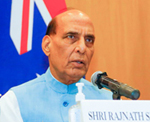

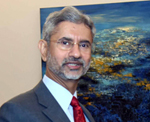

India is committed to building a robust partnership with Australia for security and growth of the entire region
On conclusion of the 2+2 Ministerial Dialogue, a joint statement was issued, highlights of which include:
- reaffirmed commitment to fully implement the CSP based on mutual trust and understanding, common interests and shared values of democracy and rule of law;
- reiterated importance of advancing shared objective of an open, free, prosperous and rules-based Indo-Pacific region;
- expand cooperation under the 2+2 framework meeting at least every two years;
- mutual resolve to combat COVID-19;
- welcome launch of India-Australia-Japan Supply Chain Resilience Initiativereiterating support to global economic recovery;
- boost cooperation in the maritime domain of Indo-Pacific in line with Joint Declaration on a Shared Vision for Maritime Cooperation in the Indo-Pacific, adopted in 2020;
- commitment to free, open, inclusive and rules-based Indo-Pacific region; Code of Conduct in South China Sea should be fully consistent with international law, particularly UNCLOS;
- commitment to centrality of ASEAN;
- commitment to Quad and its agenda for cooperation in COVID-19 vaccines, maritime security, climate change, humanitarian assistance and disaster relief, connectivity and infrastructureand critical and emerging technologies;
- cooperation in climate change and energy security to support global response;
- concern over developments in Myanmar and Afghanistan and its impact on regional stability;
- reiterated importance of India-Australia defence relationship - Australia invited India to participate in future Talisman Sabre exercises;
- agreement to reinforce mutual maritime domain awareness through information sharing and practical cooperation;
- commitment for free global commons and keeping nations secure from terrorism and piracy;
- increased cooperation in defence technologies and cooperation in defence industries including Unmanned Vehicles and other niche technologies;
- cooperation in space cyber-security, innovation, digital economy, cyber and critical technologies;
- commitment to strengthen global non-proliferation objectives;
- Australia’s strong support for India's membership of the Nuclear Suppliers Group (NSG);
- increased cooperation in counterterrorism including in multilateral fora and support for early finalisation and adoption of a UN Comprehensive Convention on International Terrorism, and;
- both sides look forward to holding the next 2+2 Ministerial Dialogue in 2023.
Defence Minister Rajnath Singh later tweeted, “At the India-Australia 2+2 meeting today, I and Dr Jaishankar had in-depth and wide ranging discussion with Minister Payne and Minister Dutton on bilateral and regional issues. We have discussed various institutional frameworks for wide ranging collaboration including defence cooperation and fight against global pandemic. We exchanged views on Afghanistan, Maritime Security in the Indo-Pacific, cooperation in multilateral formats & other related topics”.
“We invited Australia to engage India's growing defence industry and to collaborate in co-production and co-development of defence equipment” —Rajnath Singh, Minister of Defence
The 2+2 Ministerial Dialogue is aimed at further ramping up the overall defence and strategic cooperation between the two countries, including in the Indo-Pacific amid China's increasing military assertiveness in the region. The defence and military cooperation between India and Australia has witnessed an upswing in the last few years and has vast scope of expansion. On September 24, US President Joe Biden is slated to chair a meeting of the Quad leaders.





